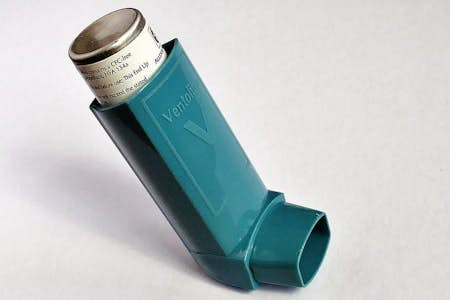The cough reflex serves to stimulate coughing and protect our airways. A chesty cough, also known as a productive or wet cough, is one in which coughing causes us to expel phlegm (thick mucus).
Phlegm builds up due to secretions occurring throughout the respiratory tract and can sometimes be a marker of chest infections. Chesty coughs are different from dry coughs, which are not productive of phlegm. A dry cough often feels like a tickle at the back of the throat and has many causes, including asthma and acid reflux.
What causes a chesty cough?
A chesty cough can be short-term (lasting less than three weeks) or long-term (lasting more than eight weeks).
Short-term cough
Short-term chesty coughs are commonly caused by respiratory tract infections, such as:
- Upper respiratory tract infection: A wet cough often accompanied by symptoms such as a runny nose, sneezing, sore throat and headache. Culprits include the common cold or flu.
- Lower respiratory tract infection (chest infection): Examples include pneumonia and acute bronchitis.
- Laryngitis: Inflammation of the voice box (larynx) due to overuse, irritation or infection.
- Acute sinusitis (sinus infection): Inflammation of the facial bones' air spaces (sinuses).
Long-term cough
When a chesty cough persists beyond eight weeks, it is called a long-term, chronic or persistent cough. Sometimes, a chronic cough can indicate an underlying disease. Causes of a persistent chesty cough include:
- Post-viral cough: Follows a respiratory viral infection.
- Post-nasal drip: Mucus drips from the back of the nasal passages down the throat and can cause trouble sleeping. For tips on how to get more deep sleep, click here.
- Chronic obstructive pulmonary disease: Long-term airflow obstruction in the lower airways associated with smoking. Learn more about this chronic disease here.
- Tuberculosis: Infectious disease that can affect any part of your body, commonly the lungs.
- Lung cancer: Often accompanied by other symptoms such as unexplained fatigue, weight loss and fever. Some types are more common in smokers. Learn more about lung and other cancers here.
- Bronchiectasis: Damaged and widened airways usually caused by chronic lung infections.
- Chronic bronchitis: Long-term inflammation of the respiratory passages, more common in smokers.
- Chronic sinusitis: Often associated with a persistent headache.
How can I manage my chesty cough at home?
You can effectively manage most chesty coughs at home. You should focus on getting plenty of rest to give your immune system the best chance of fighting off an infection and to help your cough go away naturally.
Try these remedies to ease your symptoms:
- Hot lemon and honey (soothes a sore throat).
- Painkillers (relieves a sore throat, muscle aches and headaches).
- Elevate your head with an extra pillow at night.
- Drink plenty of water.
- Steam inhalation (loosens mucus or phlegm).
- Avoid smoking.
- Exercise gently, e.g. walking (vigorous exercise may make symptoms worse).
- Open a window for fresh air.
- Saltwater gargle.
When should I seek professional advice for my chesty cough?
Most chesty coughs will improve in two to three weeks with simple home remedies and plenty of rest. However, there are times when your cough just won’t go away. This may be a sign that something more serious is causing your chesty cough, and it’s time to seek professional healthcare advice from your pharmacist or GP.
Talking to a pharmacist
Your pharmacist is an excellent first port of call if you are worried about your chesty cough. They can suggest helpful cold medicines or nasal decongestants. They may also suggest cough remedies that help suppress a cough or thin mucus.
Talking to a GP
A GP can help get to the bottom of the cause of your chesty cough. They may simply provide reassurance that your symptoms will be self-limiting or request further investigations, including blood tests, a mucus or phlegm sample, a chest x-ray or diagnostics for chest pain such as an electrocardiogram (ECG).
Antibiotics are not usually prescribed for a chesty cough because most are caused by viral infections, against which antibiotics are ineffective. A GP may prescribe antibiotics if you have a chesty cough caused by a bacterial infection or are at risk of complications. You should speak to your GP if you have:
- A cough lasting more than three weeks.
- Coughed up blood.
- Unexplained weight loss.
- A fever (>37.5℃) lasting more than three days.
- Changes to your voice.
- Difficulty swallowing.
- Lumps or swellings in your neck.
- Shortness of breath.
- Chest pain.
- A weakened immune system, e.g., due to chemotherapy or diabetes.
What can I expect when recovering from a chesty cough?
As you follow your prescribed treatments, you should start noticing your cough becoming less frequent and severe. Over the counter and prescription medications can help by soothing your throat and reducing mucus.
Remember that recovery may take time, especially for more severe cases. Be patient and stay in touch with your healthcare provider for any needed adjustments to treatment. Most people can expect to recover from a chesty cough with proper care.
What should I do about my chesty cough?
In the short term, a chesty cough can be a pesky symptom of a self-limiting respiratory infection. However, if you have worrisome symptoms or your cough becomes more persistent, it is important to consult a healthcare professional for further investigations and personalised guidance, as it may indicate a more serious underlying problem.
Image Credit: Vlada Karpovich at Pexels






